12 things to do or see before the holidays — Part 1
Before the holidays arrive, here are some suggestions of shows to see, movies to watch and podcasts or albums to listen to
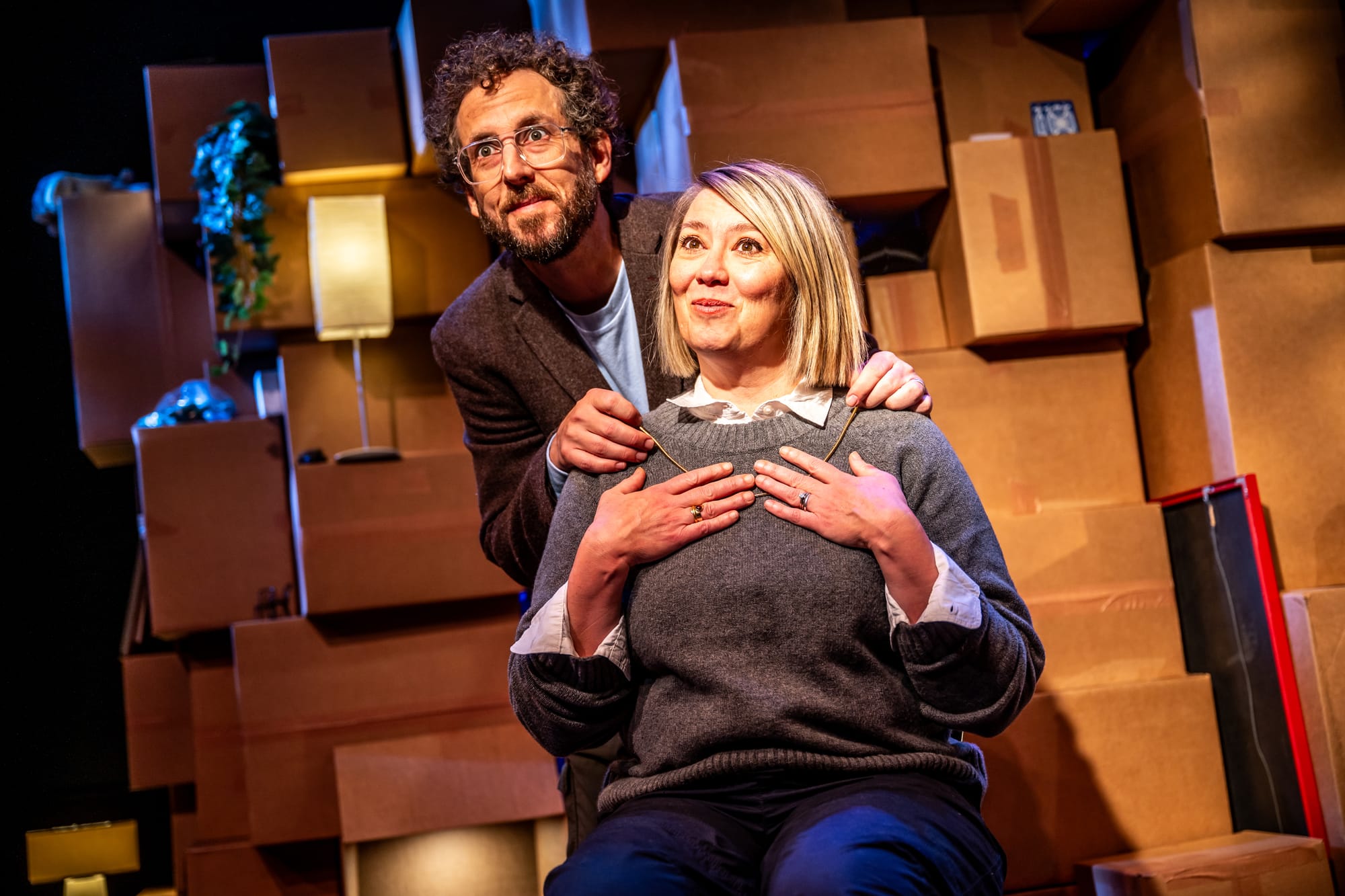
This post is sponsored by the original audio drama series Tunnel Runners, available on CBC podcasts, which features a fascinating Toronto-set story, as well as a bunch of actors (many local) whose voices you’ll recognize. See details below.
Now that December is here, and I’ve got a bunch of reviews and news to catch up on, I figured I might as well get into the spirit of things and organize my thoughts and opinions into some sort of holiday listicle — divided into two parts, like a certain movie.
Speaking of which, I’ve also included films because, as per usual at this time of year, the studios have been screening lots of holiday fare (and even some early 2025 releases) for critics before we cast our votes on year-end stuff.
1. Go see Big Stuff at Crow’s Theatre
For the past week or so I’ve been urging everyone I know to go see Big Stuff (Rating: ✭✭✭✭✭), Matt Baram and Naomi Snieckus’s miraculous show currently on at Crow’s.
I’ve followed the pair’s careers since their days at Second City, and admired what they’ve both gone on to accomplish — in film, TV, stage and podcasting. Way back in 2010 (gulp), I wrote a NOW cover story on them and their troupe (with Ron Pederson), The National Theatre of the World.
But nothing prepared me for the range of emotions and the artful mixture of laughs and tears conjured up in Big Stuff.
Seamlessly blending improv and storytelling, the two reflect on the importance of things — stuff, if you will — in their lives. Snieckus likes to hang onto items for their personal significance, while Matt is more of a tosser.
The pair anchor the show with a story about moving back to Canada from L.A., in a van full of stuff that might contain some marijuana. Carefully guided by director Kat Sandler, they take many detours, exploring how they meet and fall in love, losing parents (Matt inherits dozens of his mother’s needlepoint tapestries after she dies) and deciding to move back to be closer to their remaining aging parents.
Sandler ensures the flashbacks are handled gracefully and economically. Some of the most moving moments come when one of the two sits in to play a parent, the portrait unfussy and infused with love and honesty.
The audience participation, too, is handled beautifully. Before the show begins, we’re asked to fill out a card about an item that reminds us of a loved one. Periodically, one of the two will draw a card and ask the writer, if they’re comfortable, to explain the item and why it’s significant. These stories, and the memories and people they evoke, are exquisite.
There are other bits of group participation. Do any of us collect things? If so, what — and why? When Baram or Snieckus discuss one of the items displayed on Michelle Tracey’s set, a mountain of boxes arranged behind them, Baram (the purger) will often ask us if they should keep it or dump it in a giveaway box. Why are there so many toasters? That, too, will become clear.
What soon emerges is that on their own, items don’t have much meaning. It’s their association with people that creates the meaning. In fact, it’s the small details — rubbing Nivea cream into the hands of a parent, for instance — that make up a life.
And there is a moment near the end that — had I heard it described before I saw the show — would have seemed maudlin and sentimental. But Baram and Snieckus are such generous, warm-hearted artists that it works. Seldom have I felt a room as full of emotion and love as I did when I saw the show.
Big Stuff more than earns its lofty yet casual title. If there’s any justice in this world, it will tour the country, continent — and world. It could very well become Canada’s answer to a hit like Every Brilliant Thing. Don’t miss it.
Big Stuff has been extended to Dec. 22 at Crow’s Studio Theatre. See info here.
2. Listen to the cast recording of Chris, Mrs.
One of the most pleasant surprises last season was Katie Kerr and Matt Stodolak’s new Christmas-themed romantic musical, Chris, Mrs., which I said on this site deserved repeat visits. Now the company behind it — Boldly Productions — has released a studio album featuring members of the original production, like Danielle Wade, as well as familiar Broadway names like Danny Burstein (Moulin Rouge!, Fiddler on the Roof), Adam Jacobs (Aladdin, Tommy) and Samantha Pauly (SIX). The album is available Dec. 5. More info here.
While you’ve got your headphones on, try uploading the 2024 recording of Bad Hats Theatre’s award-winning musical Alice in Wonderland, featuring the wonderful Toronto cast that includes Tess Benger, Shakura Dickson and co-writers Fiona Sauder and Landon Doak.
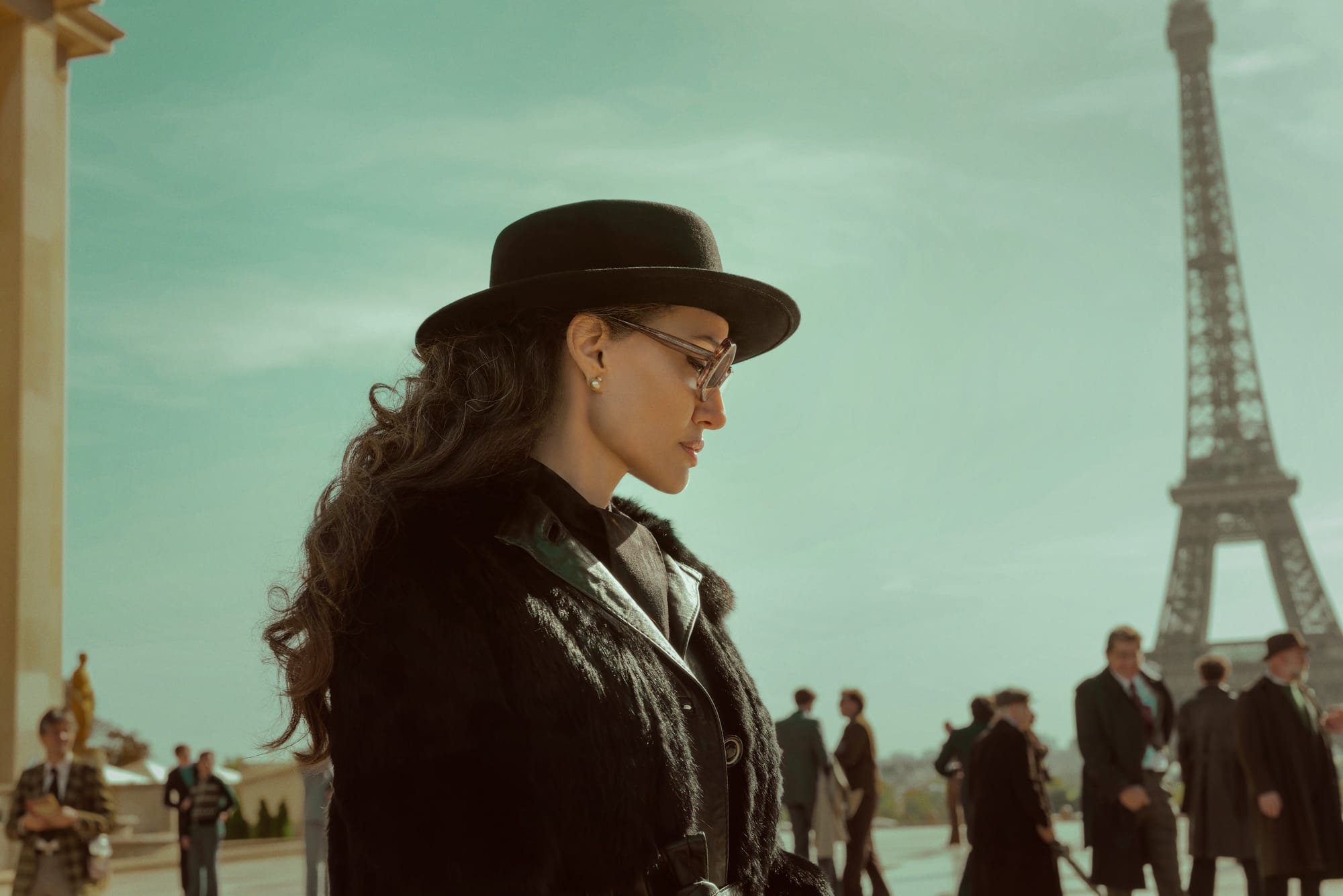
3. See some theatre-related films
By now, you’ve probably all seen Wicked, Part 1, Jon M. Chu’s blockbuster adaptation of the long-running Broadway musical. It continues to soar at the box office and now holds the record for the biggest opening weekend of any Broadway screen adaptation.
I’ve never been a huge fan of the stage show, but when I reviewed the touring production five months ago, I came to the conclusion that splitting the material up into two films was a good idea. That turned out to be the case. There’s more time to let the characters, and various plot strands, breathe.
With so many takes and TikToks out there, I don’t feel the need to review the film. I liked it; the performances are terrific — the fact that the actors (who all have extensive stage experience) sang live on set added to the excitement, I think. (Playbill recently interviewed the sound mixer, Simon Hayes.)
Ariana Grande’s comic timing surprised and delighted me; I wish Cynthia Erivo had mixed things up a little bit — sometimes her earnestness, which she perfected in the underwhelming Harriet, reads a bit rock-like onscreen. And of course, Jonathan Bailey charmed the pants off everyone onscreen and in the audience.
The film’s aesthetic choices, which my friend Radheyan Simonpillai asked director Chu about in a much-quoted Globe interview, left me a bit perplexed. I understand why Chu wanted to avoid trying to recreate the same Technicolor look from the original The Wizard of Oz, but I’m not sure what he offers makes the Oz world seem more real and less fake. It just looks washed out and drab.
If, as Chu says in the interview, the colour contrast will be going up as Elphaba brings change to the world, then that’s another reason to anticipate Part 2.
One film that hasn’t been generating much publicity is Pablo Larraín’s Maria (Rating: ✭✭✭). Inspired by the last few days of operatic legend Maria Callas, who died in September 1977, the film completes Larraín’s trilogy of iconic women of the 20th century — after Jackie, about Jacqueline Kennedy, and Spencer, about Princess Diana.
Full disclosure: I’m a big Callas admirer. I probably own more recordings by her — especially those EMI sets of operas by Verdi, Puccini and the verismo and bel canto composers, but also some fascinating bootlegs — than of any other artist in any other genre. (John Ardoin’s The Callas Legacy, which lists and analyzes every known recording of her, is one of the most well-thumbed books in my library.)
Even at the height of her powers, in the mid-1950s, her distinctive voice evoked wildly different reactions from listeners. Some (like me) consider her one of the most expressive singers ever, with a brilliant technique and an intrinsic sense of drama that comes out in every phrase.
She excelled at deeply conflicted characters; few singers communicated vengeance or jealousy better than she did. She gave depth and drama to roles — Lucia di Lammermoor, Gilda — often unfairly known merely for their pretty ornamentation.
Others considered her a bit much — extra as they say. And, in a way, she was.
I imagine there’ll be a similar divisiveness among viewers of Maria. I’m not sure how much the non-Callas fan will get from the film, which feels a bit like Sunset Boulevard crossed with Wild Strawberries.
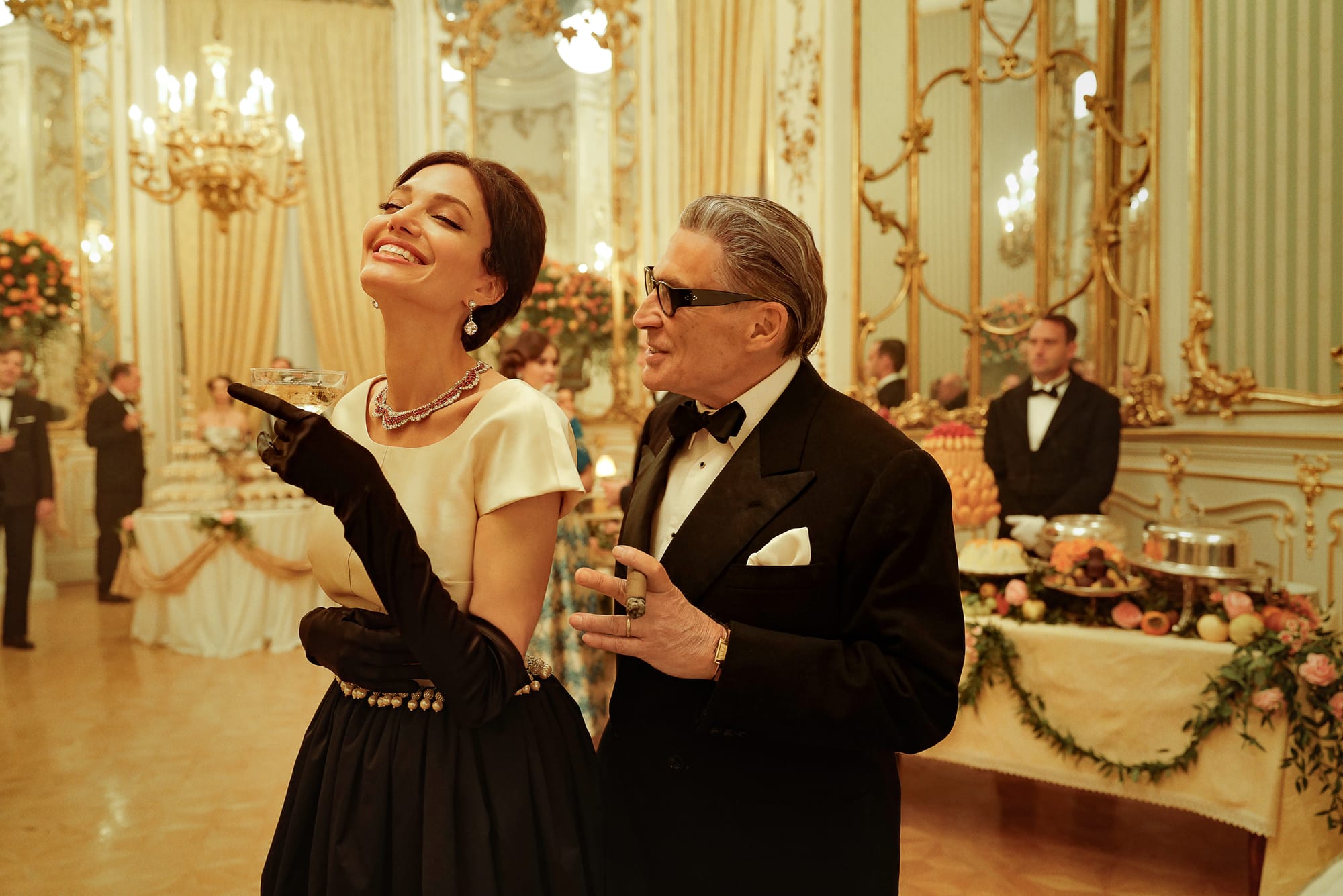
Elegant and imperious, Callas (Angelina Jolie) is her early 50s and living almost as a recluse in her spacious Paris apartment, her only companions her dog, her butler (Pierfrancesco Favino) and her cook/housekeeper (Alba Rohrwacher). She’s contemplating a comeback after years of neglecting her voice during her much-publicized, years-long affair with shipping tycoon Aristotle Onassis (Haluk Bilginer).
She’s been having problems with her heart, stemming from her misuse of the prescription drug Mandrax — a Quaalude mixed with an antihistimine. After a doctor makes a house call, prompted by her butler/caretaker, Callas keeps postponing hearing his diagnosis. Some of her side effects include visions.
This detail must have given Larraín the idea of integrating fantasy sequences into the film. And so, as Callas goes about her life — being interviewed by a TV journalist named (this is our first clue something’s odd) Mandrax (Kodi Smit-McPhee), walking the Paris streets as pedestrians break out into the Trovatore’s Anvil Chorus or the Humming Chorus from Butterfly, we wonder what’s real and what’s the result of her hallucinations.
For much of the film, Jolie plays the grande dame — a sort of operatic Miranda Priestly — wielding her power over her subordinates with passive aggressive whimsy. She’s full of contradictions, telling one admirer that she never listens to her recordings then spending all night in a haze with her recordings blasting throughout her apartment and downstairs into her building’s staircase. The actor captures Callas’s mélange of accents and careful cadences beautifully (many clips of her interviews exist).
Jolie’s performance gets a jolt of energy in the scenes recalling her affair with Onassis — she becomes another person entirely. One other place where she transforms is the stage, and Larraín recreates some of her opera triumphs with a bittersweet, elegiac elegance.
It was a mistake, though, to reduce so much Callas’s drive to her poor childhood in New York and Athens, and the cruel, selfish manipulations of her mother. This decision feels cheap and reductive.
The film looks fabulous, however, and whoever compiled the soundtrack knows opera. To begin with a rare recording of Callas/Jolie singing the Ave Maria from Otello works on so many thematic and literal levels it’s dizzying. It’s a shame the arias aren’t translated into English — the words to Tosca’s "Vissi d’arte," in a scene which Larraín stages with real poignancy, would have resonated beautifully with his subject.
Terrence McNally’s play Master Class — set a few years earlier but dealing with Callas’s later years and touching on her triumphs and tragedies — is a more successful look at the diva’s life and art.
Maria is currently in cinemas and will hit Netflix on Dec. 11
Theatre lovers should also check out The Piano Lesson, the third adaptation of an August Wilson play that Denzel Washington has produced for the streamer.
I talked with Washington, whose son Malcolm directs the film, and star Danielle Deadwyler, back in September when the film premiered at TIFF. Here’s a link to the piece. After a brief theatrical run, it’s now on Netflix.
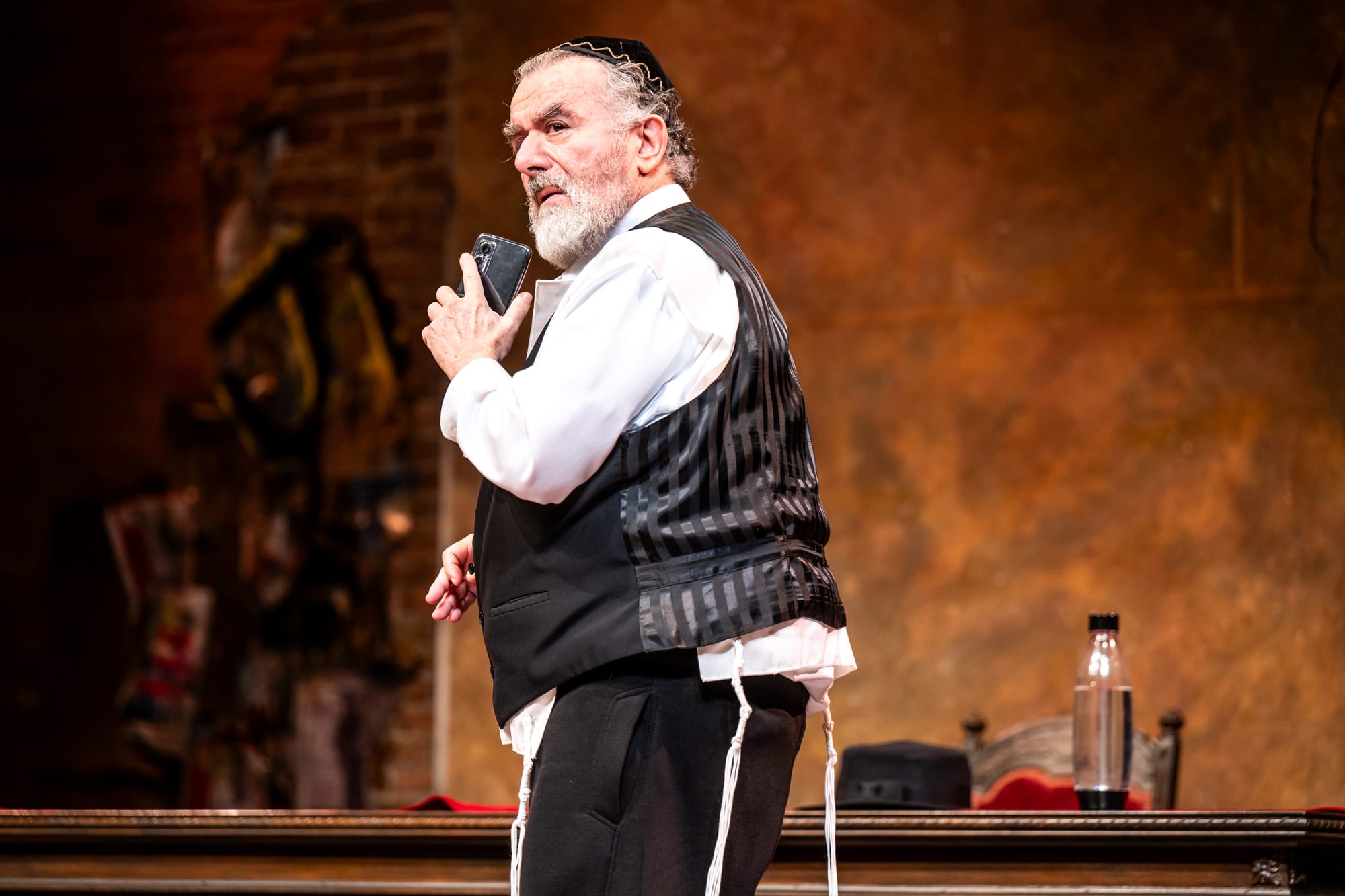
4. Learn about Toronto theatre history with Saul Rubinek
If, like me, you only know actor Saul Rubinek from his decades of film and TV work — Frasier, Unforgiven, Hunters — you’ll be amazed with his performance in Playing Shylock (Rating: ✭✭✭✭).
The premise is brilliant. During the intermission of a production of Shakespeare’s The Merchant of Venice, Rubinek, the actor playing moneylender Shylock, has learned that the show is about to be cancelled; the producing company, Canadian Stage, has apparently given in to protestors (mostly on social media) who have accused the play of anti-Semitism.
And so instead of performing in the second act, he walks out alone and addresses us, the audience, about why he — a second generation Jew of Holocaust survivors — has always wanted to do the play. This opens up themes of censorship and cancel culture (which hits home during this especially fraught season), anti-Semitism (ditto) and the role of art.
One of the most moving scenes you’ll witness this season is watching Rubinek playing his father, who himself performed in Yiddish theatre and always wanted to play Shylock, quietly explaining the power of theatre to his own father, who up until then believed the profession was shameful.
We also get a fascinating glimpse at the early days of Toronto Free Theatre, co-founded by Playing Shylock’s director Martin Kinch, which eventually became Canadian Stage, in the very space we are sitting in.
Playing Shylock continues at the Berkeley Street Theatre (26 Berkeley) until Dec. 8. See info here
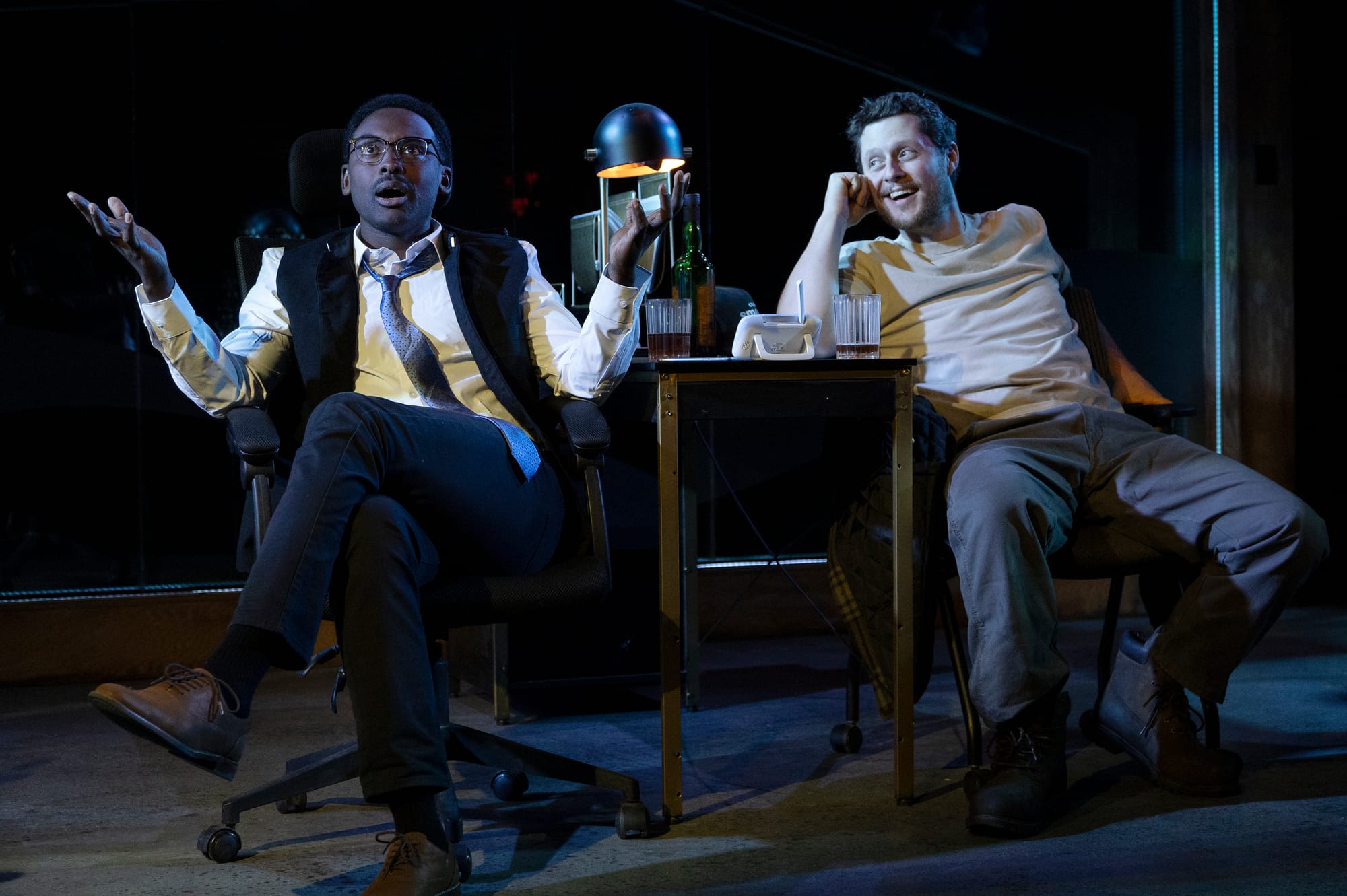
5. Marvel at two terrific young actors in a deeply resonant play
Confession: the results of the U.S. presidential election sent me into a bit of a depression from which I’m still trying to emerge. I have faith, however, that art and artists will help me get through the next four years.
And no current play makes me more hopeful about human connection — even across lines of race, class and sexual orientation — than Samuel D. Hunter’s exquisite A Case for the Existence of God (Rating: ✭✭✭✭).
The two-hander chronicles the relationship between Idaho residents Keith (Mazin Elsadig), a gay, Black mortgage broker, and Ryan (Noah Reid), a white worker at a yogurt processing plant who’s going through a divorce and is naively trying to buy a piece of property.
The two know each other because their young daughters attend the same daycare. But the circumstances of their fatherhood — and in a way their lives — couldn’t be more different. And as they get deeper into negotiations and find a connection — Keith remembers Ryan from high school, where the latter was very popular — a bit of hope emerges, even if things don’t look good for their proposed deal on paper.
Director Ted Dykstra finds lots of nuance in Hunter’s script, which gives the two mid-career actors complex, layered roles to inhabit. Reid is especially effective as a young dad who means well and hasn’t thought through things carefully, but Elsadig is just as effective as a man who’s been so marginalized he’s naturally suspicious.
Dykstra is very good at using design elements to suggest time and location shifts. The ending, an epilogue that should not be spoiled, is transcendent.
A Case for the Existence of God continues at the Coal Mine Theatre, 2076 Danforth, until Dec. 6. See my interview with actors Elsadig and Reid here. Ticket info here

6. Catch up on Tunnel Runners before this week’s finale (sponsored)
The CBC podcast PlayME takes Canadian plays and turns them into bingeable audio dramas. They’ve got dozens of shows in their archive. But if you can’t wait for the next season, which should drop early next month, and want to listen to something original, check out Tunnel Runners, created by PlayME’s Laura Mullin and Chris Tolley.
It’s a thriller about a troubled, socially awkward teen named Cam (voiced by Jordan Kuper) who runs away from his problems and joins a group of misfits who live beneath Toronto’s streets. The sinister Atlas (theatre mainstay Michelle Monteith) heads up the cadre of young, Vitamin-D deficient, disenfranchised kids (voiced by actors familiar to the local scene, like Dan Mousseau, Liz Der, Ruth Goodwin and Peter Fernandes).
Over six episodes, we’ve followed Cam get used to the rituals and hierarchies of the tunnel society, earning his place amongst their ranks — and possibly finding love with someone named Brooklyn. There have been some big twists in the most recent episodes, including the reappearance of someone from aboveground. Episode six included the loss of a beloved character, and ended with a big cliffhanger, one that may provide some answers about Cam’s early life. Also hanging over the rest of the series is the death of the show’s ambiguous villain. Is this person really dead, or are they lurking around, ready to pounce?
The final episode of Tunnel Runners drops Wed, Dec. 4. You can find it and the rest of the PlayME archive here.
